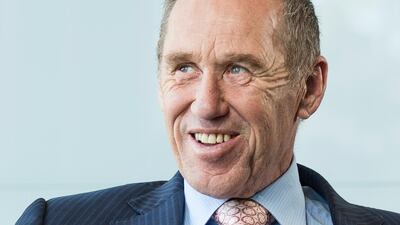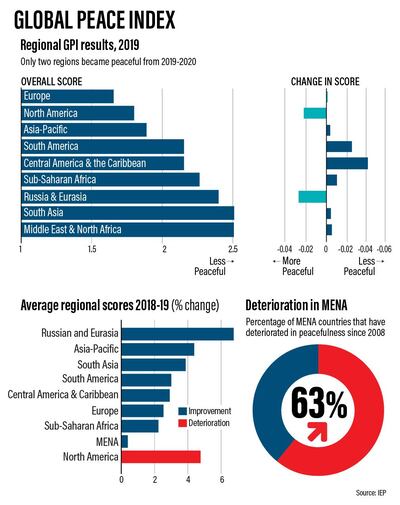The UAE has ranked above the UK in this year’s Global Peace Index.
The research found the Emirates had jumped six places from last year to 41st, while the UK was positioned 42nd.
The GPI ranks 163 independent states and territories according to their level of peacefulness.
Experts said the Emirates had outperformed Britain on indicators including lower crime rates and fewer incarcerations.
Steve Killelea, founder of the Institute of Economics and Peace (IEP), said the UAE was better positioned than most to recover from the impact of Covid-19.
The founder of the economic think tank warned other countries potentially faced years of financial instability due to the pandemic.
"All in all the UAE is in a strong position compared to many other countries to bounce back from the effects of Covid-19," Mr Killelea told The National.
“The UAE’s early lockdown has been well received and if a country’s tax intake is less than 40 per cent of its GDP (the UAE’s was 0.06 per cent in 2018) then it will be in a strong position compared to others.
“The UAE has done exceptionally well in the areas that are used to measure long-term improvements of peace.
“It’s improved in accepting the rights of others, the equal distribution of resources as well as in the function of the government.”
This year’s Global Peace Index is the ranking’s 14th annual report. It covers 99.7 per cent of the world’s population and uses 23 indicators to determine each nation’s level of peacefulness.
Results for 2020 showed the global levels of peace had deteriorated, with the average country score falling by 0.34 per cent.
Figures showed it was the ninth drop in peacefulness in the last 12 years, with 81 countries improving and 80 deteriorating in the past year.
Iceland was found to be the most peaceful country on the planet, a position it has held since 2008. It was joined at the top of the index by New Zealand, Austria, Portugal and Denmark.
By contrast, Afghanistan was found to be the least peaceful nation for the second year in a row, followed by Syria, South Sudan and Yemen.
The UAE’s ranking of 41st makes it the third highest out of 20 countries in the MENA region, behind only Qatar in 27th place and Kuwait, which was named 39th on the list.
“The key to future peace is what’s going to occur with the economic recession caused by the impact of the lockdown and the way that plays through different economies,” Mr Killelea said.
“I would expect to see global increases in violent demonstrations and more general strikes.”
Mr Killelea also warned that poorer countries would be hit the hardest by the impact of the pandemic.
“I would expect to see less money going into overseas developmental aid,” he said.
“Developed countries will turn resources internally to stimulate their own economies and this will have a knock on effect into the most fragile countries.”
Mr Killelea went on to outline how issues surrounding food security could lead to political instability and other forms of violence among more vulnerable nations.
He said tensions between the US and China would continue to escalate. US president Donald Trump announced last month he was cutting all ties with the World Health Organisation (WHO), over its handling of the pandemic, claiming the organisation was in the “total control” of China.
“The US relationship with China is deteriorating,” Mr Killelea said. “China is starting to exert more pressure as it starts to become economically stronger, we can see that in the South China Sea.
“They are dominating that region, which is something the US doesn’t want.”



